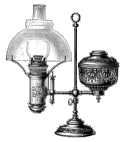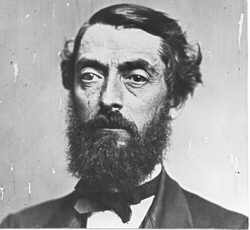Edwin Laurentine Drake was born in Greenville, Greene County, New York on March 29, 1819. After leaving the family farm at the age of 19, Drake held a variety of jobs across the midwest and eastern United States. From 1849 through 1857 he worked as a conductor on the New York & New Haven Railroad. A benefit of his railroad affiliation - free train travel - would eventually take him to Titusville, Pennsylvania.
 |
In 1857, the Pennsylvania Rock Oil Company was searching for an alternative to whale oil, which was becoming scarce and quite expensive. The company entertained the idea of digging for oil. Drake was dispatched to Pennsylvania in 1858 and got to work. This method proved to be very costly and time consuming. Digging large pits demanded a lot of resources and were plagued by ground water and cave-ins. They then turned their efforts to drilling. Drilling was successful in other ventures - fresh and saltwater wells - why not for oil?
In March of 1858, the Seneca Oil Company was formed with Drake named as general agent. He spent the better part of a year - from 1858 through the early part of 1859, raising the needed capital and procuring and building the equipment needed to drill. In the spring of 1859, he erected the derrick and started to drill for oil. He used an old steam engine to power the drilling rig. To prevent the sides of the shaft from collapsing, he drove iron pipes into the shaft and lowered the drill bit inside the pipe. As the shaft went deeper, the pipe was driven lower and lower. This was the genius of his technique.
 |
On August 27, 1859, Drake hit "pay dirt!" The well was only 69-1/2 feet deep, shallow by today's standards. It produced between eight and ten barrels of crude oil per day, although some accounts claim as much as twenty. Edwin L. Drake had succeeded in drilling the first oil well. Within a few short months, oil fields were springing up across the north-western Pennsylvania country-side and the Petroleum Industry was born.
Drake's lack of business sense eventually overtook him. Drake himself made no fortune from the industry that he was so instrumental in creating. He failed to patent his drilling invention - pipe casing for the bore hole, which would have likely netted him a small fortune. To further compound matters, the ever-increasing supply of oil drove prices down. In 1859, one barrel of oil sold for twenty dollars, two years later a barrel was selling for fifty-two cents! The market was so volatile that by 1862, Drake and his partners left the business. A year later, he lost most of his life savings due to speculative oil stock investments in New York City.
 |
Edwin L. Drake was buried in Bethlehem, but in 1901 his body was moved to the Woodlawn Cemetery in Titusville, Pennsylvania, where a wonderful monument honors his memory.
- Drake Well Museum (http://www.drakewell.org)
- Titusville Online (http://www.titusville-pa.com/)
- Oil History (http://www.oilhistory.com/index.html)


